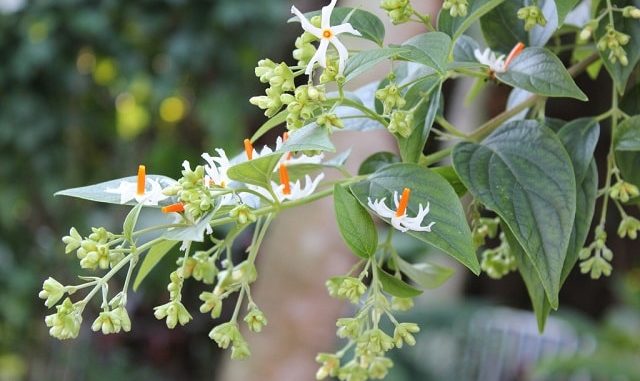
Last Updated on August 12, 2024 by admin
Parijat is also known as Harsingar. Its English name is Night jasmine. It has been used by many peoples to treat Malarial and Dengue fever. It has some anti-inflammatory property that is why some also use to treat arthritis. Due to its antibacterial and antiviral properties, parijat is used for cough and breathing problems.
Parijat is a perennial tree mostly grows in the tropical forest. Parijat has white color flowers with orange flower stalk. Some people use the flower as a vegetable to their diet.
During night time flowers blossom and covers the whole tree (that is why parijat is known as night jasmine. The tree looks white in color from far and you even find the floor covered with white flowers.
Uses of Parijat Leaves
Parijat leaves are used for many purposes. It is said that parijat leaves can alleviate inflammation and pain.
Leave of parijat are also useful in malarial fever. They act against the rise in body temperature, nausea, and diarrhea during malarial fever.
Antiallergic, Antibacterial, Antiviral property of parijat leaves makes them useful for many diseases.
Though it has many beneficial effects on our body, it has some side effects too. We will try to discuss the side effects of Parijat leaves.
Side Effects of Parijat Leaves.
For a first-time user, parijat can be hard to consume as it has a sharp bitter taste. The sharp bitter taste may cause vomiting in some.
The leaves of Harsingar contains benzoic acid, fructose, glucose, carotene, amorphous resin, ascorbic acid, methyl salicylate, tannic acid, oleanolic acid and flavanol glycosides.
If you are taking decoctions of parijat leaves continuously for months, do check with a doctor as it may cause gastric lesions due to the presence of methyl salicylate.
The tannic acid present in the Parijat leaves can cause side effects such as stomach irritation, nausea, vomiting, and liver damage if consumed in large amounts. Regular consumption of herbs with high tannin concentrations seems to be associated with an increased chance of developing nose or throat cancer.
Ascorbic acid is also known as Vitamin C can cause Diarrhea, nausea, vomiting, abdominal cramps/pain, or heartburn may occur.
Glycoside also has same Diarrhea, nausea, vomiting effect if taken a large quantity of Parijat leaves.
Bottom Lines
Every medicine/drug have some side effects along with its benefits. But we have to see how to minimize the side effects and make the drug benefit for human.
Due to the lack of adequate research in Parijat or Harsingar still, it is not used extensively. There is a scope for researchers and new ayurvedic doctors to invest time and effort to carry out research work on the parijat plant.

Sir, please me…..my mother is suffering from pain inside her rib cage…. She once drink parijat flower leaves… I think she drink 1cup… Aftr that she is suffering from that pain…..plzz help me…
Juice made from Parijat leaves should not cause chest pain. It is advised to go for a chest x-ray to rule out any other potential causes which may have caused chest pain.
Should parijat leaves concentrate be taken regularly by heart patients
I took kadha of parijat or haar shingaar leaves for one month but suffered pain and heaviness on my chest and Acute acidity.Is it due to kadha.
Hello parijat leaves can cause side effect to patients with diabetes, high BP and due to BP medicine effect kidney. It is advised to take in small amount due to arthritis.
Adhikam Amrutham Visham.
Medicine is not supposed to be consumed in large quantities or for extended periods of time. It then becomes food.
I think ‘side-effects’ should be rephrased as caution to be adhered to.
#Nia #DOJ #IC3 #FBI #TellTheWorld #worldorganisation #pentagonpolice
Ayurveda is based on natural science and so all Ayurvedic remedies are close to nature. That is, Ayurvedic medicines make use of natural herbs, extracts, and plants. One of the advantages of Ayurveda over allopathy is that the herbs and plants that it uses do not have side effects that mimic allopathic medicine. Allopathic medicine is made in labs and every allopathic medicine comes with side effects that can range from mild to severe. In Ayurvedic medicine, this is not the case because all the remedies are naturally made with natural ingredients that don’t cause devastating effects on your health.
From: DG007 #supremecourtofusa #HananyaNaftali #supremecourtofindia
Can it be given as enema of parijatha kashaya